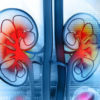Diarrhea Treatment in New Jersey
 Almost everybody experiences diarrhea. Though common, this condition can be extremely uncomfortable – especially if it won’t go away. Fortunately, patients with chronic diarrhea problems can find treatment at Bergen Medical Associates. Located in northern New Jersey, we are home to a team of more than 40 board-certified physicians, nurses, and practitioners representing various specialties and services. Learn more about diarrhea treatment at Bergen Medical Associates.
Almost everybody experiences diarrhea. Though common, this condition can be extremely uncomfortable – especially if it won’t go away. Fortunately, patients with chronic diarrhea problems can find treatment at Bergen Medical Associates. Located in northern New Jersey, we are home to a team of more than 40 board-certified physicians, nurses, and practitioners representing various specialties and services. Learn more about diarrhea treatment at Bergen Medical Associates.
What Is Diarrhea?
Diarrhea is the medical term for loose, watery stool. It is an incredibly common condition. Almost everyone is affected at some point in their life, sometimes twice or more in a year. Diarrhea can be both unpleasant and uncomfortable. While some cases are temporary and relatively harmless, others can be accompanied by serious health concerns.
Most cases of diarrhea are called acute. The diarrhea typically lasts one or two days before going away on its own. If symptoms last for longer than three to four weeks, however, the diarrhea is called chronic. Chronic diarrhea often indicates an underlying issue with the gastrointestinal tract. It may also create long-term complications, as diarrhea can lead to dehydration or malabsorption of nutrients. Medical attention is necessary to address the cause and help patients feel better.
What Are the Symptoms of Diarrhea?
The most common symptoms of diarrhea include:
- Loose, watery stools
- Three or more bowel movements per day
- Am urgent need to use the bathroom
- Loss of control over bowel movements
- Abdominal cramping or pain
- Nausea or vomiting
- Weight loss
- Fevers or chills
- Blood or mucus in stools
If diarrhea does not go away after more than a few days, it may cause dehydration by preventing the person from absorbing the fluids they need. Symptoms of dehydration include:
- Persistent thirst or dry mouth
- Infrequent urination
- Dark-colored urine
- Feeling dizzy or lightheaded
- Skin that does not flatten when pinched and released
If a person becomes dehydrated due to diarrhea, they should seek medical attention. Dehydration is a serious issue that can cause other health concerns if not addressed. A gastroenterologist can identify the cause of diarrhea and plan an effective treatment, helping the patient find relief.
What Causes Diarrhea?
Diarrhea has many possible causes, which range from minor to life-threatening. The most common causes include:
- Stress and anxiety
- Bacteria or parasites from contaminated food or water
- Viruses including the flu, norovirus, and rotavirus
- Certain medicines that contain magnesium
- Food sensitivities, such as lactose intolerance
- Food allergies, such as celiac disease
- Crohn’s disease
- Irritable bowel syndrome (IBS)
- Inflammatory bowel disease
If diarrhea goes away within a few days, finding the cause is not always necessary. If diarrhea is severe or chronic, however, identifying the cause is the essential first step in a successful treatment.
How Is Diarrhea Diagnosed?
To diagnose diarrhea, the gastroenterologist will begin by performing a physical exam and asking about the patient’s symptoms. They will then conduct diagnostic tests to rule out possibilities and pinpoint a cause. Depending on the patient’s symptoms, the doctor might request:
- Stool studies: The doctor collects a stool sample, which is tested in a laboratory to check for abnormal bacteria, parasites, and other pathogens.
- Sigmoidoscopy: The doctor uses a scope, or a flexible tube with a camera, to see inside the intestine.
- Colonoscopy: The doctor uses a scope to examine the full length of the large intestine. A biopsy, or tissue sample, may also be taken for laboratory testing.
- Imaging tests: X-ray, magnetic resonance imaging (MRI), and computed tomography (CT) scans can identify structural abnormalities or problems with how organs are formed.
- Fasting tests: The patient is asked to abstain from certain food groups over a set period. This can help identify food intolerances and allergies.
- Blood tests: A blood sample is taken and tested in a laboratory. Abnormal hormone levels may indicate a metabolic problem, while low vitamins may indicate poor absorption.
What Treatments Are Available for Diarrhea?
Diarrhea is most frequently treated with dietary changes. Patients are instructed to drink water, fruit juices, sports drinks, and salty broths to replace lost fluids and electrolytes. This will help the person avoid dehydration while the diarrhea runs its course. Soft, bland food is also recommended to reduce gastrointestinal distress.
If diarrhea is caused by a more serious underlying health condition, then symptoms will not go away until the condition is treated. Some causes, like bacterial and viral infections, can be treated with medication. Food intolerances and allergies, like lactose intolerance or celiac disease, may necessitate long-term dietary or lifestyle adjustments. Gastroenterologists at Bergen Medical Associates can advise on treatments to help the patient find relief from diarrhea.
Choose Bergen Medical Associates for Diarrhea Treatment in New Jersey
Chronic diarrhea can be uncomfortable, but patients can manage symptoms and find relief at Bergen Medical Associates. For over 25 years, we have been one of northern New Jersey’s leaders in comprehensive care for all gastrointestinal diseases and disorders. With locations across the region, patients can find treatment close to home. Request an appointment for diarrhea treatment today.










